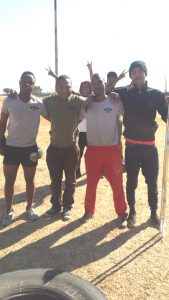Advanced training programme

 Matt Danielsson from BodyBuilding.com
Matt Danielsson from BodyBuilding.com
So, you’ve kept at it for a couple of years and should see a lot of improvement from your salad days of bodybuilding. Good for you! Now, the bad news: the road gets a lot rougher from here on.
Gaining mass was relatively easy during your first year, but now you have to fight hard for each additional pound. This is point where the smart bodybuilders are separated from the rest.
Training

By now you should have mastered the basic exercises and have a fair grasp of what machines and specialty-exercises work for you and which doesn’t. That’s a great start, but there’s also a risk you’ve established a shortlist of favorites. If you’re really good at leg extensions and have a machine that fits you perfectly, odds are you’ll keep going back to that machine week after week.
Likewise, it’s tempting to skip tough exercises like deadlifts in favor of that neat lower-back machine, followed by the low-rowing machine that hits your lats just right. In short, you’re getting comfortable with your routine, and that’s a dead-end street.
First off, you must kill your darlings. If you always do a certain exercise it ceases to be effective as the body adjusts to it, even if you increase the weight a notch once in a while. You need to switch things around, routinely try new exercises and purposefully do “inconvenient” stuff to keep the muscles guessing. It is also important to vary your sets and reps.
To establish a framework for this constantly evolving workout routine we need to switch the old cookie-cutter workout for a more dynamic approach. To accomplish this, the sample workout below has a number of blocks into which you pick one exercise from the corresponding “pool.”
Each pool, named “Chest pool #1”, “Chest pool #2” etc., are tilted towards either basic meat-and-potatoes exercises like dumbbell presses or movements like cable crossovers where the focus is more on mind-muscle connection and “feel”. Both types have their place in your workout, and the frame below makes sure you always get some of each.
It may feel a bit unusual at first, but as you get used to this type of mix-and-match workouts you’ll appreciate the flexibility. By constantly changing the exercises around, especially in combination with alternating high rep/low weight and low rep/high weight training, you should avoid plateaus and enjoy continuous progress.
At the same time, having a set frame with so-and-so many exercises for a particular bodypart, of which 2-or-3 are classic mass-builders from different angles and 1-or-2 are “feel” exercises, you can be sure no muscle group is falling between the chairs. All right, let’s have a look at a sample schedule to see how we put it together:
Sample Chest And Triceps Schedule:

Pick one exercise from each of these pools and insert into your routine.
Chest Pool #1:
- Dumbbell Bench Press: 2 sets of 6-8 reps
- Decline Dumbbell Press: 2 sets of 6-8 reps
- Bench Press Machine: 2 sets of 6-8 reps
Chest Pool #2:
- Military Press: 2 sets of 6-8 reps
- Arnold Dumbbell Press: 2 sets of 6-8 reps
- Incline Dumbbell Press: 2 sets of 6-8 reps
Chest Pool #3:
- Butterfly: 2 sets of 8-10 reps
- Cable Crossovers: 2 sets of 8-10 reps
- Dumbbell Pullovers: 2 sets of 8-10 reps
Chest/Triceps Pool #4:
- Dips: 2 sets of 8-10 reps
- Close-Grip Bench Press: 2 sets of 8-10 reps
- Pushups: 2 sets to failure
Triceps Pool #1:
- Lying Triceps Press: 2 sets of 8-10 reps
- Seated Triceps Press: 2 sets of 8-10 reps
- Triceps Pushdowns: 2 sets of 8-10 reps
Triceps Pool #2:
- Dumbbell Kickbacks: 2 sets of 8-10 reps
- Overhead Rope Extensions: 2 sets of 8-10 reps
- Barbell Triceps Press: 2 sets of 8-10 reps
Triceps Pool #3:
- Bench Dips: 2 sets of 8-10 reps
- Reverse Grip Pushdowns: 2 sets of 8-10 reps
- Rope Pushdowns: 2 sets of 8-10 reps
The 3 exercises in each pool above are just samples – you can expand and adjust your own pools as you see fit with a dozen or more options for each pool. The more exercises you add, the more variety you will enjoy while still keeping your workouts structured.
